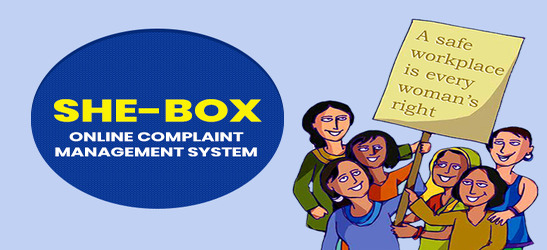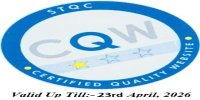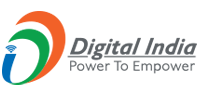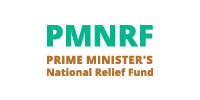1.Copyright policy
Material featured on this Website may be reproduced free of charge after taking proper permission by sending a mail to us. However, the material has to be reproduced accurately and not to be used in a derogatory manner or in a misleading context. Wherever the material is being published or issued to others, the source must be prominently acknowledged. However, the permission to reproduce this material shall not extend to any material which is identified as being copyright of a third party. Authorization to reproduce such material must be obtained from the departments/copyright holders concerned. These terms and conditions shall be governed by and construed in accordance with the Indian Laws. Any dispute arising under these terms and conditions shall be subject to the exclusive jurisdiction of the courts of India.
2.Hyperlinking policy
Links to external websites/portals
At many places in this Website, you shall find links to other websites/portals. This links have been placed for your convenience. [Department] is not responsible for the contents and reliability of the linked websites and does not necessarily endorse the views expressed in them. Mere presence of the link or its listing on this website should not be assumed as endorsement of any kind. We can not guarantee that these links will work all the time and we have no control over availability of linked pages.
Links to our website by other websites
We do not object to you linking directly to the information that is hosted on this website and no prior permission is required for the same. However, we would like you to inform us about any links provided to this website so that you can be informed of any changes or updations therein. Also, we do not permit our pages to be loaded into frames on your site. The pages belonging to this website must load into a newly opened browser window of the User.
3.Privacy policy
This website does not automatically capture any specific personal information from you, (like name, phone number or e-mail address), that allows us to identify you individually. Wherever the Website requests you to provide personal information, you will be informed for the particular purposes for which the information is gathered and adequate security measures will be taken to protect your personal information. We do not sell or share any personally identifiable information volunteered on the website site to any third party (public/private). Any information provided to this Website will be protected from loss, misuse, unauthorized access or disclosure, alteration, or destruction. We gather certain information about the User, such as Internet protocol (IP) addresses, domain name, browser type, operating system, the date and time of the visit and the pages visited. We make no attempt to link these addresses with the identity of individuals visiting our site unless an attempt to damage the site has been detected.
4.Content Contribution, Moderation & Approval Policy (CMAP)
Following this policy, we provide a role based Content Management system. This CMS helps the website team in giving role specific access of administrator panel to different users. The web administrator will also be able to manage information specifically meant for internal use, which will be viewable to all members after the successful login. Admin can create the users by assigning a user a particular role and module to which functions of a particular user are limited.
These roles are:
Creator: He / She is responsible to create content which is meant for publishing on NITI website. They are responsible to add / edit / delete content on the website within their respective working domain and send it for approval.
Moderator: He / She is responsible to approve the content presented by the creator.
Publisher: He / She is responsible to publish the drafted / approved / moderated content. He / She can edit / add / delete and review the content before publishing.
These personnel would be nominated by the Web Administrator of the site and are responsible for overall maintaining quality and quantity of information on the website. The Web Administrator will be responsible for overall supervision to ensure that authentic and updated information remains available on the site.
CMAP policy ensures following activities on the website:
- All information about the NITI, useful for the citizen and other stakeholders, is present in the 'About Us' section and mechanism is in place to keep the information up to date.
- Mechanism is in place to ensure that all the Citizen Services, Forms, Documents and Schemes, if any, are registered with the respective repositories of the National Portal.
- Website is free from offensive/discriminatory language.
- Content is compiled and packaged with citizen-centric orientation.
- Clear and simple language has been used throughout the website.
- The language is free from spelling and grammatical errors.
- Documents / pages in multiple languages are updated simultaneously.
- All information, which is of direct importance to the citizen, is accessible from the Homepage.
- Text is readable both in electronic and print format and the page prints correctly on an A4 size paper.
- There is adequate contrast between text and background color.
- Alternate text is provided for non text elements (e.g. images).
- Web pages do not contain any content that flashes for more than three times in a second.
- There is a mechanism to control scrolling, blinking content. To address this, We have provided Manual Start and Stop wherever required.
- Website ranks in the first five results on major search engines when searched with relevant keywords.
- It has been ensured that all stationery items distributed to public by NITI, as well as advertisements / public messages issued by the concerned department prominently display the URL of the web site.
5.Content Review Policy (CRP)
The Web Administrator, the assigned personnel and original content-providers are responsible for periodically reviewing the content of this website in their respective working domains and keep the information updated at all times. A proper workflow should be followed before final Updation of content on the website is affected.
6.Content Archival Policy (CAP)
Content Archival Mechanism is in place to ensure that all outdated announcements are removed from the website or moved to archive. This will help website team in ensuring that the expired content is removed from the main website. The Archival System available on the website will transfer the expired content in archives section as soon as it reaches expiry date. Archived data will be available with search option to enable search of the data within a range of period by selecting any two dates.
Note: The web manager is responsible to put the expiry date for the content, wherever applicable.
7.Contingency plan in the event of defacement/ natural calamity
The Department prepares Cyber Crisis Management Plans (CCMP) regularly. The CCMP which is verified by CERT-in includes contingency plans in the event of defacement or natural calamity. AII possible security measures are taken for the website to prevent any possible defacement/hacking by unscrupulous elements.
Data Corruption: A proper mechanism has to be worked out by the concerned Government Departments, in consultation with their web hosting service provider to ensure that appropriate and regular back-ups of the website data are being taken. These enable a fast recovery and uninterrupted availability of the information to the citizens in view of any data corruption.
Hardware/Software Crash: Though such an occurrence is a rarity, still in case the server on which the website is being hosted crashes due to some unforeseen reason, the web hosting service provider must have enough redundant infrastructure available to restore the website at the earliest.
8.Website Monitoring Plan
Websites must be monitored periodically in accordance with the plan to address and fix the quality and compatibility issues around the following parameters:
Performance: a. Site download time should be optimized for a variety of network tested for this.
Functionality: b. All modules of the website should be tested for their functionality. Moreover, interactive components of the site such as discussion boards, opinion polls, feedback forms etc. should be working smoothly.
Broken Links: c. The website should be thoroughly reviewed to rule out the presence of any broken links or errors. A number of tools and techniques are now available to easily detect the broken links in a website
Traffic Analysis: d. The site traffic should be regularly monitored to analyze the usage patterns as well as visitors’ profile and preferences. Traffic Analysis tools also give reports on broken links.
Feedback: e. Feedback from the visitors is the best way to judge a website’s performance and make necessary improvements. A proper mechanism for feedback analysis should be in place to carry out the changes and enhancements as suggested by the visitors.
9.Security policy
DoF has a responsibility to protect from disclosure to unauthorized parties the personally identifiable information (name, address, date of birth, social security number, etc.) of its website users.
DoF will not sell, trade, nor disclose the personally identifiable information of its website users to any unauthorized third parties.
DoF uses cookies to enhance the website experience for its registered users. A cookie is a small file that is stored on the users hard drive. DoF uses this file to maintain certain information about the user as they move between pages.
While using the DoF website certain information such as your IP Address and time spent on pages may be collected. This non-personal information is collected in order to monitor any unauthorized use or access to the site. Anyone caught attempting to harm, steal information from, or otherwise damage the website will be prosecuted to the full extent of the law.






















